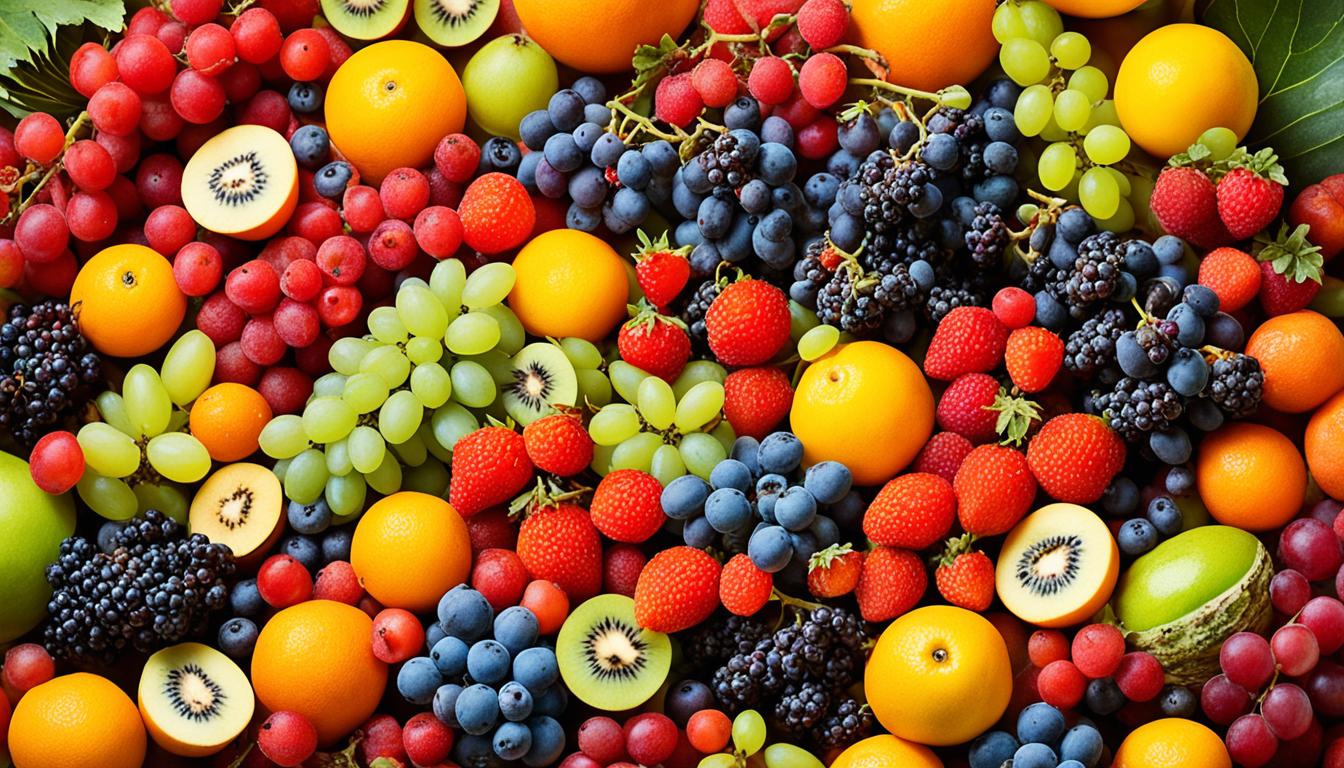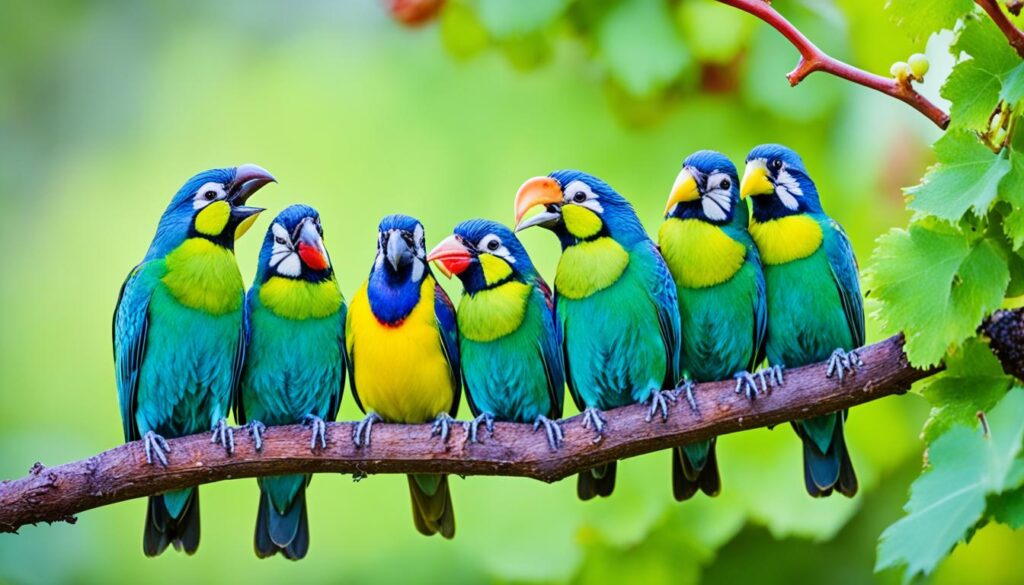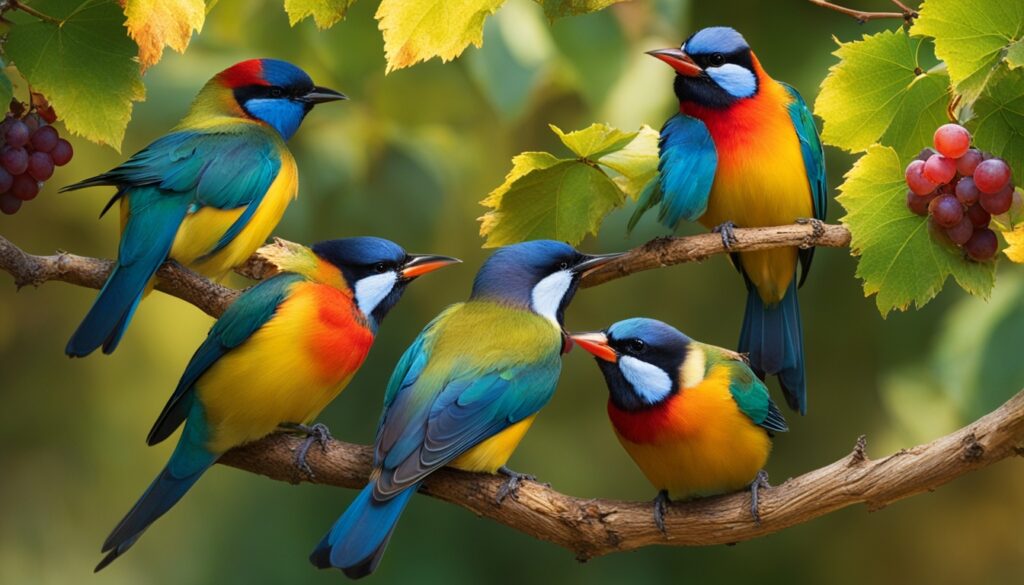Can Birds Have Grapes? Safe Snacks for Feathered Friends

As bird enthusiasts, we often wonder about the delicate balance of a bird’s diet and what foods are truly safe for our feathered friends. One such question that frequently arises is, “Can birds have grapes?” The answer may surprise you, as this juicy fruit can actually be a nutritious and enjoyable treat for many bird species. Join us as we explore the benefits of offering grapes to our backyard avian companions.
Key Takeaways
- Grapes are a rich source of essential vitamins and hydration for birds.
- Wild grapes provide vital nutrients and energy, especially during migration periods.
- A variety of bird species, including robins, jays, and woodpeckers, enjoy eating grapes.
- Grapes should be fed to birds in moderation as a treat, not a staple in their diet.
- Grapes are toxic to dogs and can lead to sudden kidney failure, so keep them away from your canine companions.
Introduction to Feeding Grapes to Birds
Wild birds have specific dietary needs that must be met to maintain their health and wellbeing. While their natural foraging diet consists primarily of seeds, insects, and berries, grapes can be a valuable supplement. Grapes are rich in vitamins, especially Vitamin C, and provide hydration and a quick energy boost, making them a nutritious treat for many bird species.
Understanding the Dietary Needs of Wild Birds
Birds in the wild have a diverse diet that varies depending on the species, season, and available resources. Their natural diet typically includes a combination of seeds, insects, fruits, and nectar. These food sources provide the essential nutrients, proteins, and energy birds require to thrive. Understanding the specific dietary needs of wild birds is crucial when considering supplementing their diet with grapes or other human foods.
Grapes as a Nutritious Supplement
Grapes can be a beneficial addition to a bird’s diet, offering a range of can birds have grapes, bird nutrition, grape toxicity, avian diet, safe foods for birds, fruit for birds nutritional benefits. They are a good source of vitamins, particularly Vitamin C, and provide hydration and a quick energy boost, making them a nutritious treat for many bird species. However, it’s important to be mindful of the potential risks associated with grape consumption, such as grape seeds danger, grape risks for birds, and to introduce grapes to a bird’s diet in moderation.
| Nutritional Benefits of Grapes for Birds | Potential Risks of Grapes for Birds |
|---|---|
|
|
“Proper nutrition is essential for the health and wellbeing of wild birds. Grapes can be a valuable supplement, but they should be introduced and fed in moderation.”
Nutritional Benefits of Grapes for Birds
Grapes are a highly nutritious fruit that can provide a wealth of benefits to our feathered friends. These juicy berries are packed with essential vitamins, minerals, and antioxidants that can support the overall health and well-being of birds.
Rich in Vitamins and Hydration
One of the primary advantages of feeding grapes to birds is their impressive Vitamin C content. This vital nutrient helps strengthen a bird’s immune system, enabling them to better fight off illness and infections. Additionally, the high water content in grapes makes them an excellent source of hydration, particularly important during hot weather when birds may be at risk of dehydration.
Quick Energy Boost for Migratory Species
For migratory bird species that undertake long, arduous journeys, the natural sugars found in grapes can provide a quick and efficient energy boost. These quick-burning carbohydrates can help sustain birds during their strenuous migrations, ensuring they have the fuel they need to reach their destinations safely.
According to recent data, grapes are a beneficial source of essential minerals such as Potassium and Manganese for parakeets, fulfilling their nutritional needs. Raisins, being dried grapes, are also enjoyed by parakeets due to their size and texture, making them easier to eat and digest.
It’s important to note that while grapes can be a fantastic addition to a bird’s diet, moderation is key. Birds, particularly smaller species like budgies, should only be fed one or two grapes per week to avoid potential health issues like obesity due to their sensitive digestive systems. Dehydrated grapes, such as raisins, have a higher sugar content that is unnecessary for budgies and should be avoided.
When feeding grapes to backyard birds, it’s essential to thoroughly rinse the fruit to remove any harmful chemicals or pesticides. Cutting the grapes into smaller portions can also help ensure that smaller birds can consume them more comfortably.
Can Birds Have Grapes? A Resounding Yes!
Contrary to the concerns some bird owners may have, grapes are entirely safe for birds to consume. This fruit is a natural part of the diet for many wild bird species, and they can enjoy the sweet taste and nutritional benefits without any adverse effects. As long as grapes are prepared and provided in moderation, they can be a healthy and enjoyable snack for your feathered friends.
In fact, grapes offer an array of essential vitamins and minerals that can support the overall health and well-being of your backyard birds. From the robust Vitamin C and Vitamin K found in grapes to the quick energy boost they provide, this fruit can be a valuable addition to your bird’s balanced diet.
However, it’s important to note that the sugar content in grapes should be monitored, as excessive consumption can lead to digestive issues. A few small, seedless grape pieces a couple of times a week is generally considered a safe and enjoyable treat for most bird species.
To ensure your birds can safely enjoy grapes, be sure to choose organic, pesticide-free varieties and thoroughly wash and cut them into bite-sized pieces before offering them to your feathered friends. By incorporating grapes into your bird’s diet in moderation, you can provide a nutritious and delightful snack that they’re sure to love.

“Grapes are a natural and healthy addition to the diets of many wild bird species, offering a sweet and hydrating treat that can complement their overall nutritional needs.”
Bird Species that Enjoy Grapes
A wide variety of bird species are known to relish the sweet taste of grapes. From the familiar American Robin to the vibrant Blue Jay and industrious Woodpecker, these feathered friends can often be spotted pecking away at grapes in vineyards or backyard gardens. Providing grapes as a supplemental food source can be a great way to attract and nourish the diverse bird population in your area.
Robins, Jays, and Woodpeckers
The American Robin, with its distinctive rust-colored breast, is particularly fond of grapes. These adaptable birds will readily consume grapes, both ripe and unripe, off the vine. Blue Jays, known for their striking blue and white plumage, are also avid grape enthusiasts, often flocking to vineyards or orchards in search of this sweet treat. Woodpeckers, such as the striking Pileated Woodpecker, can sometimes be spotted clinging to grape clusters, pecking away at the juicy fruit.
Cardinals, Waxwings, and More
The vibrant red Cardinal is another bird species that enjoys grapes. These charismatic birds will often visit backyard feeders or grape vines to indulge in the flavorful fruit. Cedar Waxwings, with their sleek crests and yellow-tipped tails, are also known to feast on grapes, particularly during the migratory season when they need a quick energy boost. Additionally, species like Mockingbirds, Orioles, and even Finches have been observed relishing the sweet taste of grapes.
By providing grapes as a supplemental food source, you can attract a diverse array of bird species to your backyard and support their nutritional needs. Just remember to practice moderation and avoid overfeeding, as grapes should be offered as part of a balanced avian diet.

Preparing Grapes for Backyard Birds
When it comes to providing grapes as a treat for your feathered friends in the backyard, proper preparation is key. Many bird species, from American robins and bluebirds to tanagers and woodpeckers, eagerly enjoy the sweet and juicy fruit. However, to ensure their safety and comfort, it’s important to take a few simple steps before offering grapes to your avian visitors.
Cutting Grapes for Smaller Birds
Smaller birds, such as finches and sparrows, may have difficulty consuming whole grapes. To make the experience easier and prevent any choking hazards, it’s recommended to cut the grapes in half. This simple step allows these petite birds to more easily access the delectable fruit without struggling.
Avoiding Pesticides and Moderation
When selecting grapes for your backyard birds, it’s crucial to ensure they are free from any harmful pesticides or chemicals. These substances can be detrimental to the birds’ health, so opt for organic or pesticide-free grapes whenever possible. Additionally, while grapes can be a nutritious supplement to a bird’s diet, they should be offered in moderation. Excessive consumption of grapes, particularly the high sugar content, can lead to digestive issues or other health problems. Veterinarians advise limiting the number of grapes fed to captive birds, such as parrots or cockatiels, to one or two per day, a couple of times a week.
By carefully preparing and moderating the grapes you offer, you can help ensure your backyard birds enjoy a safe and healthy treat. With a little extra consideration, you can provide them with a delicious and nutritious supplement to their diet.
Potential Risks and Precautions
While grapes can be a nutritious and tasty treat for birds, it’s crucial to be aware of the potential risks they pose to other household pets, particularly dogs. Grapes and their dried counterparts, raisins, are highly toxic to canines and can lead to sudden and severe kidney failure, even when consumed in small amounts.
Grape Toxicity in Dogs
If you have dogs that have access to the areas where you feed your feathered friends, it’s essential to keep any grapes completely out of their reach. Ingesting grapes or raisins can have potentially fatal consequences for dogs, so responsible pet owners must prioritize their safety.
Experts are still uncertain about the exact mechanisms behind grape toxicity in dogs, but it’s believed that certain compounds within the fruit can disrupt normal kidney function. Even a few grapes can trigger this dangerous reaction, so it’s not worth the risk.
To ensure the safety of all your pets, it’s best to avoid feeding grapes near areas your dogs frequent and to store any leftover grapes securely out of their access. By taking these precautions, you can enjoy the bird-friendly benefits of grapes while protecting your canine companions.
Conclusion
In conclusion, grapes can be a safe and nutritious snack for birds when provided in moderation and prepared properly. By understanding the dietary needs of wild birds and the benefits of grapes as a supplement, bird owners can confidently offer this fruit to their feathered friends. Grapes are a great source of carbohydrates, vitamins, and minerals that can benefit birds, including providing hydration, boosting energy levels, and supporting immune and skin health.
However, it’s crucial to be mindful of the potential risks, such as grape toxicity in dogs, and to take the necessary precautions when feeding grapes to birds. This includes thoroughly washing the grapes to remove any harmful pesticides, cutting them in half to prevent choking, and limiting the quantity due to the high sugar content. By following these guidelines, bird enthusiasts can safely incorporate grapes into their avian companions’ diets and enjoy the rewarding experience of attracting a variety of bird species to their backyard feeders.
Ultimately, the key is to focus on providing a balanced and nutritious diet for birds, using grapes as a supplementary treat in moderation. By prioritizing bird safety and well-being, bird owners can create a thriving, bird-friendly environment that benefits both their feathered friends and the overall ecosystem.







